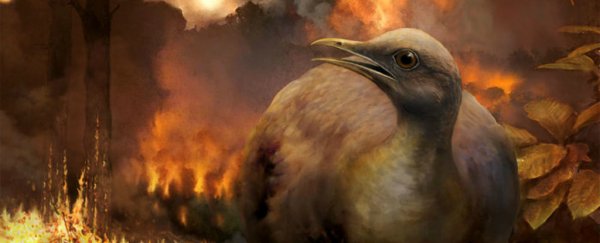For quite a while now, scientists have known that birds made it through a deadly asteroid catastrophe when most dinosaurs didn't. But, according to a new study, it was really just a lucky handful of avian ancestors that survived.
The deadly asteroid strike in Chicxulub, Mexico happened some 66 million years ago, and it wiped out three-fourths of all species on Earth, including most non-avian dinosaurs.
A team led by Daniel Field, a vertebrate palaeontologist at the University of Bath, is now arguing that most tree-dependent birds were also wiped out because of ensuing forest fires, leaving just a few ground-dwelling survivors behind.
As a result, the researchers have hypothesised that the rich diversity of birds on our planet today could have started from just a few small species of ground-dwelling birds that looked similar to modern day quails.
"The ancestors of modern tree-dwelling birds did not move into the trees until the forests had recovered from the extinction-causing asteroid," says Field.
The researchers looked at the fossil record from right after the asteroid impact, which showed huge amounts of charcoal from burnt trees, and an abundance of microscopic fern spore fossils afterwards.
"After a disaster like a forest fire or a volcanic eruption, the first plants to come back are the fastest colonisers - especially ferns," explains palaeontologist Regan Dunn from the Field Museum in Chicago.
The tree-dwelling species of birds would have had a tough time surviving in this environment, and clues in the evolutionary branches of modern bird species further support this idea.
Comparing a collection of fossilised avian skeletons from before and after the asteroid impact, the researchers found that the survivors were ground-dwellers, as evidenced by their skeletal differences - such as longer, sturdier legs.
The common ancestor of all birds we have today "was almost certainly a ground-dwelling bird," Field told Ed Yong at The Atlantic.
But while the results of this study are compelling, there are certainly challenges as well. Some experts think the scope of the study was too narrow to warrant such wide-sweeping conclusions.
"It's difficult to conclude all forests disappeared globally based on [just] evidence from northern areas," molecular evolutionist Alan Cooper, who was not involved in the study, told Science.
Additionally, it's possible that other evolutionary factors played a role in the survival of certain bird species, and the wipe-out of forests was just one element in the picture.
"No one factor caused the end-Cretaceous extinction and similarly no one factor caused the extinctions within [the birds]," palaeontologist Jingmai O'Connor from the Institute of Vertebrate Paleontology and Paleoanthropology in China told Yong.
"Forest loss was only one of several factors working in combination that determined which bird lineages survived."
The study has been published in Current Biology.
